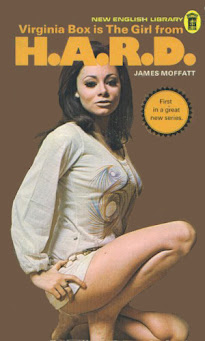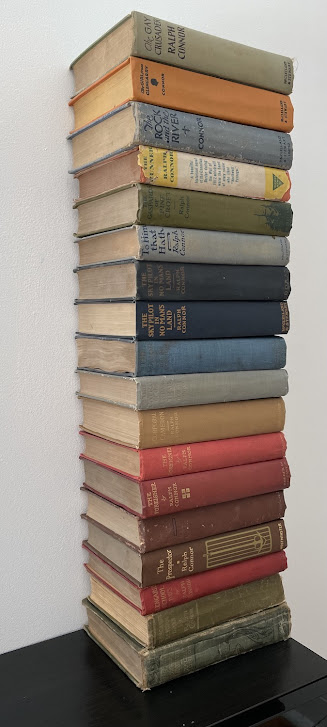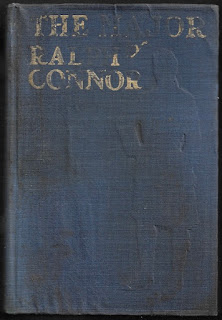06 June 2022
Accidents Never Happen in a Perfect World
03 June 2022
Reading Writing About Richard Rohmer
Lieutenant-General Richard Rohmer's commanding countenance graces the cover of the new issue of Zoomer, just now hitting the stands. A cover boy at 98, his appearance owes something to Her Majesty's Platinum Jubilee. In the corresponding article, "A General Fit for a Queen," Ian Coutts writes of Rohmer's decades-long relationship with our monarch, his life, his various careers, and his bestselling thrillers.
I'm honoured to have been interviewed for the piece. An elementary school discovery, Richard Rohmer was my very first favourite Canadian author. Eight years ago, with pals Chris Kelly and Stanley Whyte, I resolved to read every single one of his books. We very nearly succeeded. The blog Reading Richard Rohmer documents our adventure.
Richard Rohmer hasn't published a new book since 2007's Ultimatum 2. And so, I was excited to read this in Ian's article: "As we wind down the interview, Rohmer hands me the dazzling, fiery abstract cover design for the non-fiction book he is working on, about high air temperatures in the Rockies and melting permafrost."
How's that for a teaser?
Long live the queen!
Long live the general!
01 June 2022
The Dustiest Bookcase: W is for Wiseman
Adele Wiseman
Toronto: Prototype, 1978
58 pages
Adele Wiseman died thirty years ago today.
Still unread – by me, anyway – this copy of Testimonial Dinner was brought out of storage by a savvy bookseller the next day.
$15.00
Signed.
I was an easy mark.
A play, Testimonial Dinner has the very look of a self-published book. Perhaps it was. In The Force of Vocation: The Literary Career of Adele Wiseman (Winnipeg: University of Manitoba, 2006), Ruth Panofsky, writes that it was "printed privately for the author."
I may not have read Testimonial Dinner, but I have read and reread the back cover. In my twenties, it seemed unbelievable. Thirty years later, Wiseman's experience doesn't surprise me in the least.
30 May 2022
Walking in on Virginia Box and Baird Rodd
James Moffatt
London: New English Library, 1974
112 pages
I first visited the UK in 1974, arriving on a British Airways jet still painted in BOAC colours. My mother had brought us – my sister and myself – to meet relatives and friends of our late father. She gave me fifteen pounds, by far the most money I'd ever held held, which I spent it on a hardcover copy of the most recent Guinness Book of Records, a SHADO Interceptor, and a SHADO 2 Mobile.
The SHADO Dinkys have proven good investments – I have them still – but if I could go back in time, I would buy every copy of Skinhead, Suedehead, Demo, Boot Boys, Skinhead Escapes, Skinhead Girls, Glam, Smoothies, Sorts, Teeny Bopper Idol, Top Gear Skin, Trouble for Skinhead, and Skinhead Farewell I could find. Written by Canadian James Moffatt, sold for 30p, few can be purchased for under one hundred quid today.
The Girl from H.A.R.D.: Virginia Box and the "Unsatisfied" was published during that 1974 summer in England. The second novel in the series, Moffatt presumes that the reader has read the first (right). I had not, but found it took little time to get up to speed. H.A.R.D. is the Hemisphere Administration for Regional Defence. Virginia Box – "leggy, busty blonde" – is its most valued agent. Baird Rodd is her superior. He sits on a "phallic-backed chair" behind a buttock-shaped "erotic desk."
It stank of Rodd manipulation. As if her boss had deliberately put the computers to work and punched Box against lesbian and waited for a tray of cards to provide him with some inner, perverted sense of achievement.
Quickly now, she dressed. When she finished she postured before the mirrors again. The small, uplift brassiere did nothing except emphasise how firm her breasts really were and hoe exciting their nipples could be when fully awakened. The transparent blouse let every man see this. And the mini-skirt only served too whet appetites which could not, after one glance, have failed to be already whetted. Curvaceous legs, more curvaceous thighs beckoned sensually."You're a sight for sore, lecherous eyes," she told her glassy self.
Object and Access: A slim softcover. If WorldCat is to believed – why should it? – only the National Library of Scotland has a copy. Mine was bought four years ago. I see only one copy listed for sale online. At US$9.96 it might seem a bargain, but the bookseller lists the shipping from New Zealand to Canada at an even US$37.00.
13 May 2022
$2 Connors
I will pay no more than two dollars on a book by Ralph Connor. This policy has stood me well. To date, my Connor collection consists of eighteen volumes – nearly all first editions – purchased at a total cost of thirty dollars and fifty cents.
This 1901 Westminster copy of The Man from Glengarry is the oldest. One bookseller believed it to be a first edition, and hoped that it would bring twenty dollars. Perhaps it did. I rescued it from a pile of books considered too damaged to be sold in a Friends of St Marys Public Library book sale.
The very first Connor I ever bought is this Triangle edition of The Runner, his 1929 novel of the War of 1812. The only one to have a dust jacket, I was won over by the publisher's description.
I found this 1917 McClelland, Goodchild & Stewart edition of The Major at an outdoor bookstall in London, Ontario. It's in pretty rough shape, but at one dollar I couldn't resist. Besides, it was about to rain.
Imagine my surprise in discovering this inscription after returning home:
I bought this copy of The Prospector for two dollars from a bookseller who knew it was signed. He'd given up on his dreams of making $9.95... or even $5.00.
You too can own a signed Connor! They can be purchased online for as little as US$12.00.
Too dear for me.
I began this piece forgetting that I'd mentioned my $2 Connor policy in a 2016 review of The Man from Glengarry. At the time, my collection consisted of sixteen titles. In the six years that have followed that number has grown by only two.
Has inflation taken its toll? Is two dollars now too low? Should be I raising my cut-off to three dollars? Four?
What think you?
02 May 2022
Ralph Connor's Canada Dry
A Tale of the MacLeod Trail
Ralph Connor [Charles W. Gordon]
454 pages
We begin on an Inverleith rugby pitch. Scotland is up against Wales in the International. It's a close contest, in part because Allan Cameron, fierce-fighting half-back of the Scottish line, hasn't been playing up to snuff. In the dying minutes, the Scots get a lucky break when the ball comes tumbling Cameron's way. He hesitates, and the promise of victory turns to defeat.
"Oh-h-h-h, Cam-er-on!" is the novel's first sentence. What has happened to Scotland's star player?
The answer is drink.
This is not to suggest that Cameron was under the influence during the game, rather that "he was out of condition; he had let himself run down last week, since the last match, indeed, got out of hand a bit."
The loss isn't the worst of it. Days later, Cameron faces arrest for passing a forged cheque. He doesn't remember doing so, but is unable to deny the charge because... well, you know, drink.
The half-back is saved from arrest by Miss Brody, rugby-loving niece of the Chairman of the Board of Directors of the Bank of Scotland, and Cameron's conscience is later cleared when a dishonourable drinking buddy owns up to the crime. However, the damage has been done; Cameron has decided to give up drink, give up his studies, and make a new life for himself in Canada, envisioning himself "a wealthy rancher, ranging over square miles of his estate upon a 'bucking broncho,' garbed in the picturesque cowboy dress."Instead, he ends up a low-level clerk at a Montreal shipping company.
The job doesn't last long – something to do with losing his temper and throwing his superior against a wall – and so, newly unemployed, Cameron does what we've all done in the same situation by taking in a travelling circus. There he chances upon farmer Tom Haley and his son Timmy who've come to the city to take in the show and purchase provisions for the family farm. Sadly, young freckle-faced Timmy winds up outside one of the drinking tents dotting the circus grounds as inside his father – rather sloshed – begins dipping into the money meant for baking flour and such. Cameron comes to the rescue by dragging Tom out, beating back "circus toughs" in the process.
Grateful and somewhat sobered by the violence, Tom offers our hero a position on his farm, twelve miles outside of town. Cameron accepts. Before long, he's proven himself an expert milker of cows, hoer of beets, player of bagpipes, and temperate role model to young Timmy. Over the course of the growing season, unrefined Mandy, the farmer's daughter, falls for the new hired hand, which scares Cameron into setting out for the West.
Corporal Cameron of the North West Mounted Police is divided fairly evenly into three books, each with very different settings: Inverleith, Montreal and surrounding countryside, and the Canadian West. As a reader I found the first the most entertaining. As a Montrealer, the second held some interest, but only because it depicted a unilingual city that never existed. The last third, in which our hero finds an enemy in a whiskey trader, held the most action, but there's only so much fisticuffs and gunplay I can take. Its depiction of "our Indians" and mythologizing of the NWMP was particularly hard to stomach:
To the whole country the advent of the police proved an incalculable blessing. But to the Indian tribes especially was this the case. The natives soon learned to regard the police officers as their friends. In them they found protection from the unscrupulous traders who had hitherto cheated them without mercy or conscience, as well as from the whiskey runners through whose devilish activities their people had suffered irreparable loss.
The administration of the law by the officers of the police with firm and patient justice put an end also to the frequent and bloody wars that had prevailed previously between the various tribes, till, by these wild and savage people the red coat came to be regarded with mingled awe and confidence, a terror to evil-doers and a protection to those that did well.
Bloomer: "When a fellow gets on the bum and gets into a hole he knows well that there'll be a lot of people tumbling over each other to get him out, hence he deliberately and cheerfully slides in."
Trivia: The novel was adapted to the silent screen in 1921 as Cameron of the Royal Mounted; an interesting title change given that the Royal Canadian Mounted Police had replaced the North-West Mounted Police (note the hyphen) just the previous year.


























